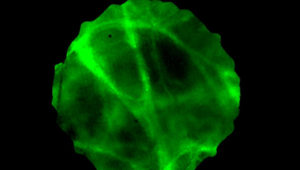- ...
Postgraduate Studentships - Search for funding opportunities.
Postgraduate Studentships - Search for funding opportunities.

Healthy (ex vivo) human lung tissue seen through an endoscopic device built in Bath and fitted with cutting-edge optical fibres
Bath researchers are building innovative devices to access the deepest chambers of the lungs, as part of a major project to find coronavirus treatments.
Scientists at the University of Bath are developing optical fibres and building endoscopic devices designed to access the tiny airways deep within a person’s lungs, as part of a major project that aims to find effective treatments for patients with Covid-19.
Contributing to the rapid-response project, the University’s Centre for Photonics and Photonic Materials has produced an opening batch of 360 optical fibre-based endoscopic devices and is now testing them for safety. If the devices prove easy to sterilise and robust enough to introduce into a patient’s body, they will be produced in their hundreds, and sent to research collaborators at the University of Edinburgh.
The Edinburgh team of 150 scientists believes new therapies could be discovered and implemented before a vaccine becomes widely available by repurposing medicines for other conditions that are already in clinical use or are currently being tested. Dr Jim Stone, research fellow at Bath’s Department of Physics and a member of the photonics team, said: “The endoscopic devices we produce contain our cutting edge optical fibre technology and are very small – around 1.4mm in diameter – so they can reach parts of the lungs that are usually very hard to access. Once an endoscope has reached the (deep and tiny) distal airways, we can take samples of lung fluid for analysis or introduce a trial drug.”
Optical fibres included in the endoscopes transmit microscopic images, providing researchers with real-time microscopic images from deep within the lungs at the exact location where drugs are delivered, or fluids are sampled.
Dr Stone said Bath was in a strong position to fine-tune its existing optical fibres and devices to fulfil the requirements of the coronavirus project. “We’ve been making fibres to address clinical needs for six years,” he said. “It’s a matter of adapting the work we’ve been doing on bacterial infections to focus on viruses instead.”
He added: “My experienced research team are refocusing all of their efforts on Covid-19 enabling us to develop and produce all the devices needed by our clinical collaborators in Edinburgh.”
The project – STOPCOVID – will focus on the inflammatory pathways that lead directly to lung injury, a response associated with the most severe aspects of Covid-19.
Inflammation is important in fighting infection but in the case of Covid-19, excessive inflammation is causing the lungs to fail, in some cases leading to death.
Researchers will test drugs to see if they can block this and other damaging types of inflammation in the early stages of the disease to change the course of infection and prevent the need of a ventilator.
STOPCOVID has secured £2 million funding from LifeArc, a medical research charity. It aims to raise a total of £15 million from the private sector. Discussions are continuing with other potential partners.
The team is already collaborating with scientists from pharmaceutical companies from across the world and has already identified key drugs and mechanisms that are currently in development or are being used for other diseases.
STOPCOVID will be based at Edinburgh BioQuarter, which will unite interdisciplinary scientists from the Centre for Inflammation Research, clinical research teams in NHS Lothian and University of Edinburgh, regulatory teams, and clinical trial networks. Such close proximity will allow close and immediate collaboration, researchers say. Drug manufacturing facilities on site will allow for quick testing of potential treatments.
The Medicines and Healthcare products Regulatory Agency (MHRA) have agreed to work closely with the team to fast track any potentially successful work while following due diligence. Any drugs that provide positive early results will be rolled out as part of national and international clinical trials through UK Trials Platform.
This approach could have a beneficial impact on millions of people who are affected worldwide, experts say. It could be a significant boost for low and middle income countries where people do not have access to intensive care and ventilation facilities.
Funding for the project will cover trial and clinical costs, data analyses and scaling up testing of drugs that show promise. Professor Kev Dhaliwal, STOPCOVID lead and Consultant in Respiratory Medicine at the University of Edinburgh, said: “Covid-19 is the biggest global challenge of a generation. By developing new therapies that stop the inflammatory cascade associated with the most severe aspect of the disease – leading ultimately to respiratory failure – we can prevent the need for a ventilator. We must unite together, across sectors, across disciplines, across continents to tackle the devastating effects of this virus as fast as possible.”
Find out more about the University of Bath’s Centre for Photonics and Photonic Materials here

About University of Bath At Bath we are known for excellence in teaching and research; our welcoming community; and for providing students with outsta...
Sign up to Postgraduate Studentships
Sign up to compare masters
Thanks for making your selection. Click below to view your comparisons.